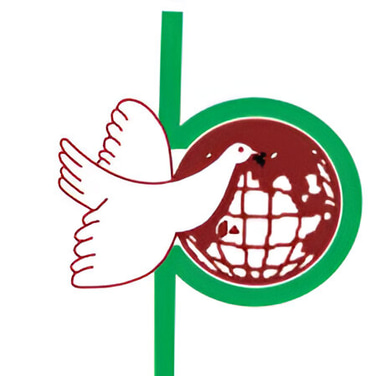Key Achievements of Six Focus Areas
Since its inception, IIRD has made significant contributions across six core thematic areas. These achievements reflect our commitment to holistic rural transformation, rooted in sustainability, equity, and empowerment.
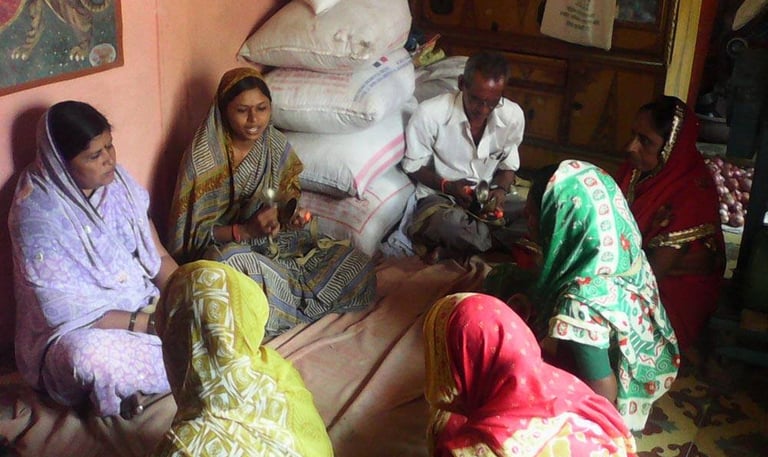

Livelihoods and Poverty Alleviation
IIRD has made remarkable progress in promoting poverty alleviation and sustainable livelihoods by delivering skill-based training in organic agriculture, allied sectors, and non-agricultural trades to enhance employability in rural areas. Rural entrepreneurs have been supported with access to start-up capital, customized to their enterprise type and scale. To strengthen business sustainability and growth, end-to-end development and advisory services have been provided. IIRD has also enabled farmers and producers to connect with markets through organic bazaars, cooperatives, and real-time market information systems. Over the years, more than 10,000 rural micro-enterprises have been developed in areas such as goat rearing, dairy, poultry, tailoring, agri-processing, vegetable cultivation, and bio-input production. In addition, rural women have been mobilized into savings and credit groups to foster financial inclusion and support micro-entrepreneurship.
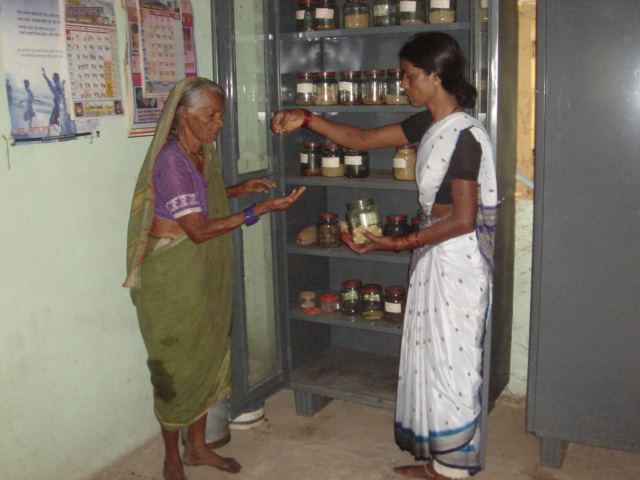

Health and Nutrition
IIRD’s health and nutrition interventions have centered around community ownership, particularly led by women. Trained Vikas Sevikas and Mahila Mandals have taken the lead in raising awareness about disease prevention, sanitation, nutrition, and hygiene. Weekly training sessions for rural women leaders have been organized, focusing on primary healthcare, the use of herbal remedies, and maternal and child health, encouraging peer-to-peer learning across villages. Functional Village Health Committees have been formed to conduct health surveys, identify local health issues, and develop grassroots action plans. Community Learning Centres have hosted Village Clinics, where doctors visit twice a week to provide medical care and distribute medicines, especially to the elderly and the destitute. Monthly health camps have been conducted in partnership with women’s groups, with special focus on respiratory and eye care, and over 135 cataract surgeries have been facilitated for elderly rural residents. Nutrition education has been promoted through field demonstrations using local knowledge and indigenous resources to support balanced diets, while home and kitchen gardens using organic methods have improved household food security.
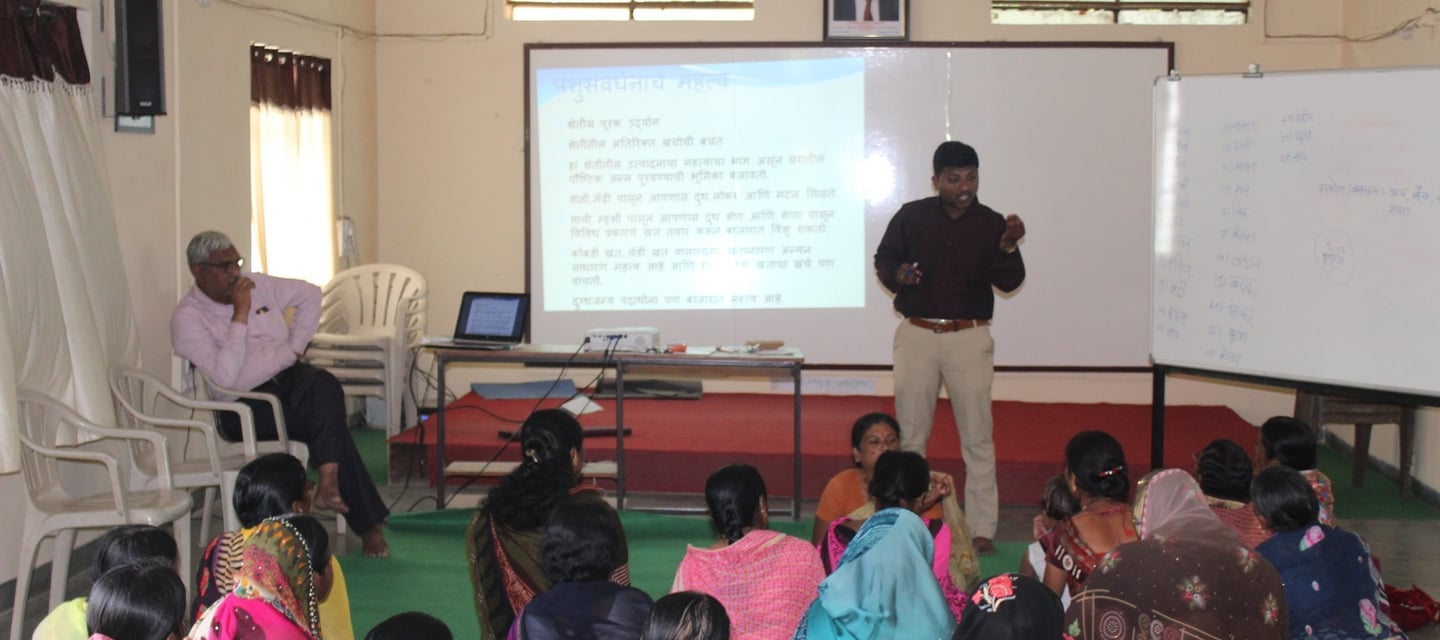

Education and Skill Development
To address the education and skill gaps in rural communities, IIRD established the Green College on its campus, creating a hub for agriculture-based skill development. Training has been delivered through various formats, including one-day modules in organic vegetable cultivation, animal husbandry, and bio-input production; short-term one-month courses in goat rearing, backyard poultry, and dairy farming; and medium-term three-month programs in organic farming, advanced animal husbandry, and bio-input application. Nearly 3,000 rural youth, particularly from marginalized communities, have been trained in sustainable agriculture and allied sectors, significantly enhancing their employment prospects and livelihood security. IIRD has developed a wide range of certified vocational courses tailored to rural realities, delivered through Farmer Field Schools and structured training modules. The Fast Track Acceleration Programme was introduced to mentor High Potential Rural Youth (HPRY), providing them with business development services and entrepreneurial guidance. These initiatives have nurtured a new generation of rural ecopreneurs committed to both economic and environmental sustainability. Further bridging the rural skill gap, IIRD has contributed to increased income and dignified livelihood opportunities. The institute has also introduced IGNOU certificate programs in Organic Farming and Water Management and has facilitated technical training through its ITI and Paarrie Centre for Technology (PCT), offering courses in tailoring, beauty and wellness, masonry, carpentry, electricals, computer basics, gardening, and music.
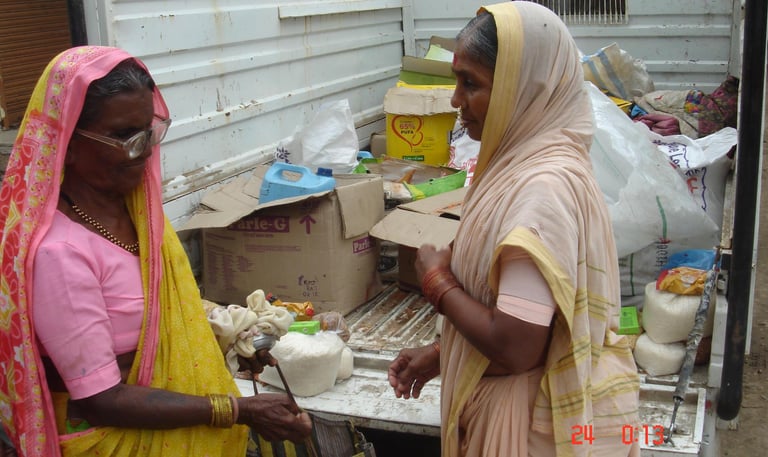

Women’s Empowerment and Social Inclusion
IIRD has mobilized and strengthened over 400 Mahila Mandals across 90 villages in Aurangabad district, fostering grassroots leadership and collective action among rural women. Rural women leaders, known as Vikas Sevikas, were trained in health, nutrition, child care, and community mobilization. Hundreds of women-led Self Help Groups (SHGs) were formed to promote financial inclusion and entrepreneurship. Local women were also trained as environmental stewards, engaging actively in ecological restoration, home gardening, biodiversity conservation, and the revival of traditional knowledge systems.
Through intensive capacity-building in organic farming, more than 3,000 women with small landholdings restored over 8,000 acres of land using indigenous, eco-friendly practices. These efforts reduced dependency on chemical farming, improved food security, lowered input costs, and renewed interest in sustainable, women-led agricultural systems. Women also undertook integrated farming practices that included animal husbandry, herbal healthcare, and organic kitchen gardening creating diversified livelihood opportunities.
Women’s voices were empowered in community decision-making processes through functional literacy initiatives, awareness training, and their participation in institutional bodies such as village health and biodiversity committees. Marginalized women, including widows, elderly women, and single women, were included through participatory programs and social welfare schemes such as the Adopt-a-Granny initiative. Gender justice and economic independence were advanced by linking women to savings groups, micro-enterprises, and marketing platforms like Organic Bazaars. One of the most notable achievements was the establishment of an all-women Board of Directors for the Mahagreen Producer Company, which now has over 1,100 farmer members.
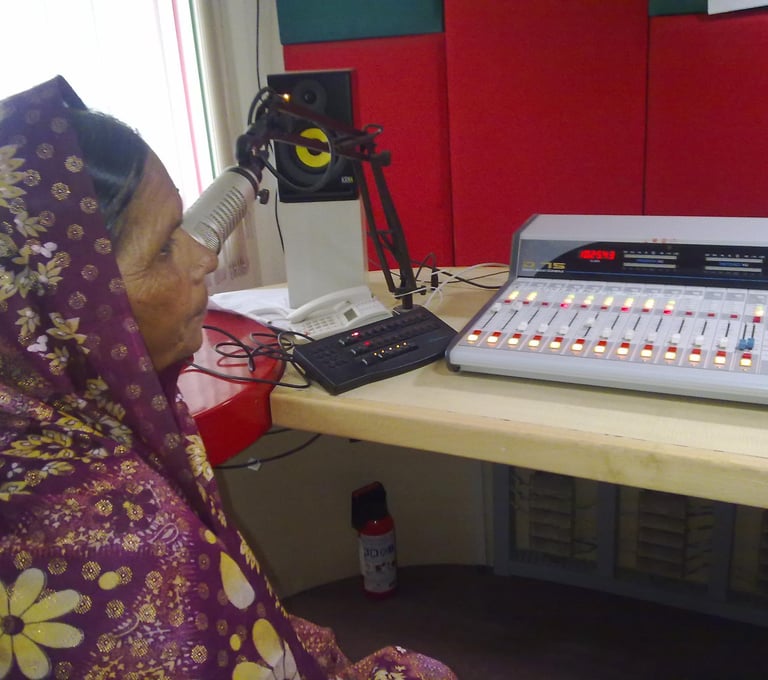

Environment and Sustainable Development
IIRD has championed sustainable farming and biodiversity conservation in over 90 villages of Aurangabad district, helping to revive more than 8,000 acres of land under organic cultivation by 3,000 predominantly women farmers. Around 5,000 indigenous tree saplings have been planted across project areas as part of eco-restoration and afforestation efforts, contributing to climate resilience, biodiversity regeneration, and soil conservation.
Seven Community Learning Centres (CLCs) have been established in key villages, each serving as a hub for 10 to 14 surrounding villages. These centres promote participatory learning, environmental education, and decentralized planning. Local agro-biodiversity was documented through community-generated registers, and Paryavaran Sevikas (eco-volunteers) were trained to lead biodiversity conservation and awareness activities at the grassroots level.
Demonstration plots in 10 villages have been used to preserve and promote 52 indigenous varieties of crops including cereals, pulses, oilseeds, and vegetables. These seeds were distributed to local farmers, while Seed Banks were created in six CLCs to conserve over 200 native seed varieties. A Seed Manual was also developed to document their characteristics, cultural practices, and economic value. In partnership with the Department of Social Forestry, afforestation drives using native species were carried out along community lands, roads, and farm boundaries.
IIRD conducted soil and water conservation programs, biodiversity mapping, and eco-restoration campaigns to build local capacity for managing both on-farm and off-farm ecosystems sustainably. The organization strengthened the organic value chain by facilitating Organic Bazaars and implementing the Participatory Guarantee System (PGS) for organic certification, helping farmers access stable markets and ensuring consumer trust.
Water conservation initiatives were implemented in 20 drought-affected villages across five Marathwada districts—Aurangabad, Jalna, Hingoli, Parbhani, and Beed. A cadre of “Paani Sevikas” was trained to lead local water conservation efforts, supported by Village Water Committees for decentralized governance. Infrastructure development included the construction of 10 check dams, several gabion bunds, sunken ponds, farm ponds, water absorption trenches (WATs), continuous contour bunds, and the deepening and desilting of 24 natural streams. A nursery with a capacity of 3 lakh seedlings was established to support the planting of over 5,000 trees in rural areas.
Sanitation and hygiene were also addressed through the construction of 200 household toilets in Tondoli village making it Open Defecation Free and 675 additional toilets in surrounding villages. Toilets were also constructed in 13 rural schools, improving hygiene and access for students. Furthermore, over 100 affordable homes and community shelters were built to improve rural housing conditions and strengthen social infrastructure.
Governance, Advocacy, and Partnerships
IIRD has played a pivotal role in shaping national and regional frameworks for sustainable agriculture and organic farming in India. It was a key contributor to the formation of national standards for organic agriculture, which laid the foundation for broader organic farming policies and practices adopted across the country. The organization was also instrumental in promoting the Participatory Guarantee System (PGS) for organic certification, which has since been integrated into national policy frameworks. As the designated Asia Coordination Office for the International Federation of Organic Agriculture Movements (IFOAM), IIRD has actively influenced sustainable agriculture policy across the Asia region.
In addition to its policy advocacy work, IIRD has led capacity-building initiatives by organizing numerous national and state-level training programs, conferences, and workshops on topics such as biodiversity conservation, sustainable agriculture, and community-led certification systems. These events have contributed to policy refinement while also strengthening grassroots implementation across various regions.
IIRD’s development efforts have been amplified through strategic partnerships with state and central government bodies, national agencies, and international development organizations. These collaborations have enabled integrated projects in water management, sanitation, affordable housing, biodiversity conservation, and sustainable livelihoods. International partners have included organizations such as DESWOS, HIVOS, EED, Bread for the World (BftW), Canadian High Commission, HelpAge International, Habitat for Humanity, Deutsche Welthungerhilfe e.V., the International Network Urgency, Associated Country Women of the World (ACWW), IFOAM, and IUCN–World Conservation Union. On the national front, IIRD has worked with the Ministry of Agriculture (both State and Central), NABARD, Bajaj Auto CSR, Maharashtra Centre for Entrepreneurship Development (MCED), AFARM, and the Maharashtra Gene Bank (Indian Institute of Science Education and Research), among others.
